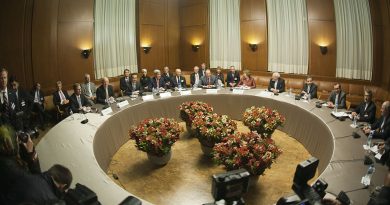Growing Threat of Russian Invasion in Ukraine Raises Grave Concerns in Washington and Europe
Joshua Powanda
Staff Writer
This past week, U.S. Secretary of State Antony Blinken traveled to Europe to meet with partners and adversaries to discuss the growing threat of a Russian invasion of Ukraine. According to the Military Times, Russia has built up nearly 120,000 troops as well as conventional military equipment along its border with Ukraine and Belarus, signaling a potential invasion in the coming weeks.
Although Russia began building up its forces late last year, American and NATO officials warn that Russian President Vladimir Putin may decide to give the “go ahead” at any moment. During a press conference this week, CNN reports that President Biden expects Russia may soon “move in” and begin its process of territorial acquisition.
According to the Associated Press, Secretary Blinken asserted “an unshakable U.S. commitment to Ukraine’s sovereignty and territorial integrity” but has yet to define the limits of such commitment. Given Ukraine’s lack of NATO membership, the United States and its European allies have no treaty obligation to defend Ukraine with their conventional forces.
The possibility of Ukraine’s acceptance into NATO is one significant reason for Vladimir Putin’s aggressive posture in the region. During the Soviet and early post-Soviet years, Ukraine was directly under the political, military, and economic control of Moscow. This changed in 2014 when pro-Russian President Viktor Yanukovych was ousted from the presidency due to massive protests throughout Ukraine.
In recent years, Kiev has made significant efforts to align itself closer to the West through stronger military and economic cooperation. Kiev has even expressed public openness about the possibility of the growing democracy’s eventual acceptance into NATO.
According to The Washington Post, Russia not only views this as a threat to its national security and sphere of influence but also as an insult to the historical unity of Russians and Ukrainians. This was outlined in an article written by Vladimir Putin describing the history of these two nations as “one”. It seems Vladimir Putin not only has a desire to maintain the security of the Russian motherland, but to also reclaim territory that was once under the influence of the Russian Empire, the Soviet Union, and the early Russian Federation.
Although it may seem that American hands are tied given its lack of obligation to defend Ukraine, the U.S. has threatened several punitive actions should Russia go forth with a potential invasion. Reuters explains that following failed talks with a Russian delegation in Geneva, Secretary Blinken warned of “swift, severe” economic and political penalties that include sanctions of Russia’s critically important energy industry and top government officials, as well as cutting Russia off from the global financial banking system. While these threats would severely impact the Russian economy and Russian long-term economic growth, it remains to be seen whether they will deter Putin from achieving his territorial acquisition objectives in Ukraine.
The Center for Strategic and International Studies reports that it is vitally important that Moscow see any such military victory in Ukraine as long and costly. Any prolonged insurgency that grinds away at the Russian military is a means of deterrence against Putin’s ambitions.
Reuters also reports a litany of Russian demands that would stop such an invasion from ever happening. These include a moratorium on NATO’s expansion eastward closer toward the Russian border, as well as a commitment that Ukraine will never join the Western security alliance. Given NATO’s current Open Door Policy, however, the U.S. alone cannot make such guarantees
If talks eventually break down, a Russian invasion of Ukraine would drastically alter the landscape of regional and international politics. Not only would Russia’s expansion undermine and dismantle an entire nation-state, but it would also raise concerns of a new conflict with the West. Whether an attack happens from the south through Crimea, the north through Belarus, or the center through Kharkiv and the Donbas, such an attack would only inflame tensions between Russia and the West.

